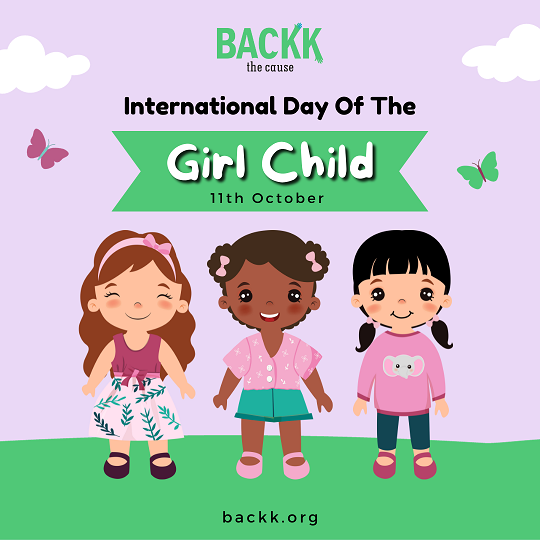Introduction
Every year on October 11th, the world comes together to celebrate the International Day of the Girl Child, a day dedicated to promoting gender equality and highlighting the challenges and opportunities facing girls worldwide. In India, this day holds immense significance as the nation continues its journey towards empowering its girl children and ensuring they have equal opportunities to thrive. This blog will explore the significance of the International Day of the Girl Child in the Indian context and shed light on the progress made and the challenges that still exist.
Empowering Girl Children in India
1. Education for All
One of the primary focus areas in India's efforts to empower girl children is education. Over the years, the country has made significant strides in improving girls' access to quality education. Initiatives like the Sarva Shiksha Abhiyan and Beti Bachao, Beti Padhao have contributed to increasing enrollment rates among girls in schools. However, challenges such as dropout rates, especially in rural areas, and the quality of education remain areas that need continued attention.
2. Changing Mindsets
India's patriarchal society has long perpetuated gender stereotypes and discrimination. To empower girl children, it's crucial to challenge these mindsets. Grassroots movements, awareness campaigns, and government initiatives have played a role in changing perceptions about the capabilities and roles of girls. Empowerment starts with dismantling stereotypes and promoting gender-neutral opportunities.
3. Health and Nutrition
Ensuring the health and nutrition of girl children is vital for their overall development. The government has introduced schemes like the National Nutrition Mission (Poshan Abhiyan) to address malnutrition among children, with a particular focus on girls and pregnant women. Additionally, menstrual hygiene management programs aim to break the stigma surrounding menstruation and provide access to sanitary products.
4. Legal Framework
India has enacted various laws to protect the rights of girls and women, including the Protection of Children from Sexual Offences (POCSO) Act and laws against child marriage and dowry. These legal frameworks are crucial in safeguarding the rights and dignity of girl children.
Challenges Faced by Girl Children in India
1. Child Marriage
Despite legal prohibitions, child marriage remains a significant concern in many parts of India. Early marriage can have adverse consequences on a girl's health, education, and future prospects. More efforts are needed to enforce laws and raise awareness about the dangers of child marriage.
2. Gender-Based Violence
Girls in India often face various forms of gender-based violence, including harassment, domestic abuse, and trafficking. Strengthening law enforcement, providing support services, and fostering a culture of zero tolerance for violence against girls are essential steps forward.
3. Unequal Opportunities
While progress has been made, girls in India still face disparities in access to opportunities, especially in traditionally male-dominated fields like STEM (Science, Technology, Engineering, and Mathematics). Encouraging girls to pursue careers in these areas and providing scholarships and mentorship programs can help bridge this gap.
Conclusion
The International Day of the Girl Child in India is a reminder of the country's commitment to empowering its girl children and ensuring they have equal opportunities to succeed. While progress has been made in various areas, challenges persist, and there is much work to be done. It is essential for individuals, communities, and the government to continue working together to break down barriers, challenge stereotypes, and create a more inclusive and equitable society where every girl child can thrive and become a leader of tomorrow. Let us celebrate the potential and resilience of India's girl children on this day and every day, as they are the future change-makers of our nation.



